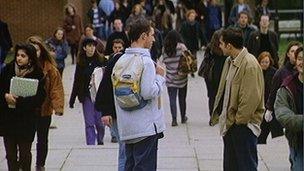Universities 'face financial challenges ahead'
- Published

UUK says funding challenges lie ahead for universities in the short to medium term
UK universities face years of financial challenge following changes to funding, to the recruitment of overseas students and higher fees, a report warns.
Government changes to higher education could impact on the UK's skilled workforce and economic growth, warns the group Universities UK (UUK).
UUK says a volatile economic climate contributes to a challenging future for the higher education sector.
The government said its reforms had created a more competitive sector.
Under these changes, fees have tripled, with universities allowed to charge up to £9,000 a year.
And changes to admissions allowed institutions, from last autumn, to admit as many students with at least two A grades and a B at A-level as they liked. From this autumn this will be lowered to students with ABB.
'Uncertain times'
In its report, The Funding Environment for Universities, UUK says institutions have shown a "readiness to embrace change", by adapting their financial strategies to "prepare for uncertain times ahead".
But it says funding challenges lie ahead for universities in the short to medium term.
The study says that in 2012, the first year of the tuition fee hike, England's universities recruited around 28,000 fewer students than expected.
This drop in student numbers, which was about 9% lower than anticipated, came amid a decline in the number of 18-year-olds, changes in the numbers of students deferring degree places and fears by universities that they would face financial penalties for under or over-recruiting students, the report says.
The research also found a fall in postgraduate students and "significant" reductions in 2012-13 in the numbers of new entrants to UK universities from countries such as India, Pakistan and Nigeria.
This trend is set against a backdrop of tighter rules on student immigration, which affect student entry requirements, their entitlements during their studies and their options after they graduate.
UUK says the proportion of universities meeting their international recruitment targets fell by 7% between 2011-12 and 2012-13.
It says the failure for student numbers to grow at the same rate as in 2010-11 means that the UK has already missed out on millions of pounds.
'Unprecedented changes'
In his introduction to the report, Professor Eric Thomas, UUK president and vice-chancellor of Bristol University, said: "From 2011 to the present day and beyond, the UK's universities are experiencing unprecedented changes in the policy environment, in the funding of higher education and in the recruitment of international students."
This was happening against a backdrop of a "volatile" economic situation and changes in the population.
Prof Thomas said: "The UK's universities have demonstrated their readiness to embrace change by modifying their financial strategies to prepare for uncertain times ahead.
"However, this report finds that institutions face a number of challenges in the short to medium term in funding capital expenditure.
"There is also evidence to suggest that the sector is significantly constrained in terms of its ability to expand in a sustainable manner in the medium term.
"This has long-term implications for the UK's skilled workforce, productivity and economic growth."
A spokesman for the Department for Business, Innovation and Skills said higher education across the world was changing rapidly.
"Our reforms have laid the foundations for a better funded and more competitive sector, with a ring-fenced research budget, more resources for teaching, and a renewed focus on the quality of the student experience.
"We are delivering more choice to students by relaxing number controls and ensuring a more diverse sector.
"With the demand for higher education growing worldwide, we are developing an industrial strategy for education exports to ensure the UK's universities can take advantage of the growing international appetite for learning."
- Published30 May 2013
- Published22 May 2013